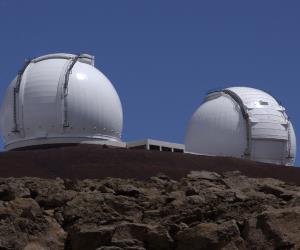W. M. Keck Observatory

The W. M. Keck Observatory is a two-telescope astronomical observatory at an
elevation of 4,145 meters (13,600 ft) near the summit of Mauna Kea. They are
considered the two most scientifically productive telescopes on Earth.
Because of this fundamental difference in design, Keck Observatory's telescopes
arguably remain the largest steerable, optical/infrared telescopes on Earth.
The telescopes are equipped with a suite of instruments, both cameras and
spectrometers that allow observations across much of the visible and near
infrared spectrum.
The Keck Observatory is managed by the California Association for Research in
Astronomy, a non-profit 501(c)(3) organization whose board of directors includes
representatives from Caltech and the University of California.
Construction of the telescopes was made possible through private grants totaling
more than $140 million provided by the W. M. Keck Foundation. The National
Aeronautics and Space Administration (NASA) joined the partnership in October
1996, at the time Keck II commenced observations.
Telescope time is allocated by the partner institutions. Caltech, the University
of Hawaii System, and the University of California accept proposals from their
own researchers. NASA accepts proposals from researchers based in the United
States, while the National Optical Astronomy Observatory (NOAO) accept proposals
from researchers around the world.
Location
Mauna Kea Access Rd
Kamuela, Hawaii County
Hawaii,
USA
Getting There
The W. M. Keck Observatory is located near the summit of Mauna Kea on the Big
Island of Hawaii. Here are some ways to get there:
By Car: The observatory is accessible by car, but the road to the summit of
Mauna Kea is steep and winding, and can be treacherous in bad weather
conditions. A 4-wheel drive vehicle is recommended, and it's important to check
road conditions before making the trip.
By Tour: There are several tour companies that offer guided trips to the summit
of Mauna Kea, including stops at the Keck Observatory. These tours typically
include transportation, and the guides can provide information about the
observatory and the surrounding area.
By Air: Visitors can take a helicopter tour of the Big Island that includes a
flyover of Mauna Kea and the observatory.
It's important to note that visiting the Keck Observatory requires advance
planning and reservations. The observatory does not offer public tours or
visits, and access to the summit of Mauna Kea is restricted. Visitors should
check the observatory's website for information about visiting and making
reservations.
Nearby Airports
This is a list of primary airports in Hawaii that have scheduled passenger service on commercial airlines.
| Airports in Hawaii |
|---|
|
•
Daniel K. Inouye International Airport |
undo Major Attractions in Hawaii